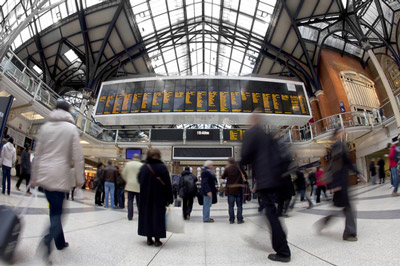2016 rail fares to rise by an average 1.1 percent
Posted: 4 December 2015 | | No comments yet
2016 rail fares will rise by an average 1.1 percent from January next year, the smallest annual increase for six years. The Rail Delivery Group has announced train fares will rise 1.1 percent on average from 02 January 2016. Passengers are now able to find out the price of new national rail fares from today […]


2016 rail fares will rise by an average 1.1 percent from January next year, the smallest annual increase for six years.


The Rail Delivery Group has announced train fares will rise 1.1 percent on average from 02 January 2016. Passengers are now able to find out the price of new national rail fares from today online or at ticket offices.
In total 1.65 billion rail passenger journeys were made during 2014-15, equating to more than 4.5 million a day. According to the Rail Delivery Group, the large increase in passenger numbers has resulted in train companies generating extra returns for the government, contributing almost six times greater income to support rail investment, up from 400 million to £2.27billion.
|
Overall average fares increase |
|
|
Jan 2010 |
1.1% |
|
Jan 2011 |
6.2% |
|
Jan 2012 |
5.9% |
|
Jan 2013 |
3.9% |
|
Jan 2014 |
2.8% |
|
Jan 2015 |
2.2% |
|
Jan 2016 |
1.1% |
Commenting on today’s announcement, Paul Plummer, chief executive of the Rail Delivery Group which represents train operators and Network Rail, said:
“We know that nobody likes to pay more to travel by train, especially to get to work, and at 1.1 per cent this is the smallest average increase in fares for six years.
“On average 97p in every pound from fares is spent on trains, staff and other running costs”
“On average 97p in every pound from fares is spent on trains, staff and other running costs. With passenger numbers doubling in the last 20 years, money from fares now almost covers the railway’s day-to-day operating costs.
“This allows government to focus its funding on building a bigger, better network when the railway is becoming increasingly important at driving economic growth, underpinning jobs, and connecting friends and families.
“As an industry, we are working closer together to deliver better stations, more trains and improved services, and to get more out of every pound we spend.”
“Passengers still need much more action from train operators and the Government to give them a truly affordable railway”
In reaction to the fare increase, Martin Abrams, Public Transport Campaigner, Campaign for Better Transport, said:
“Campaign for Better Transport has successfully campaigned for the rise in regulated rail fares to be limited to inflation only, so we are glad to see that being implemented this year. However, fares have increased by over 25 per cent in the last five years and passengers still need much more action from train operators and the Government to give them a truly affordable railway.
“While regulated rail fares rises are limited to 1%, some unregulated, walk-on fares, are rising further. To avoid pricing people off the railways, the train operating companies and the government need to work closely together to provide fairer, simpler and cheaper fares through flexible ticketing and making sure people are always sold the cheapest ticket available.
“The government’s smart ticketing strategy is a shambles so we need to see the introduction of a nationwide Oyster style smart ticketing system, making local tickets redundant and ensuring passengers get a public transport system which allows them to get around easier.”



